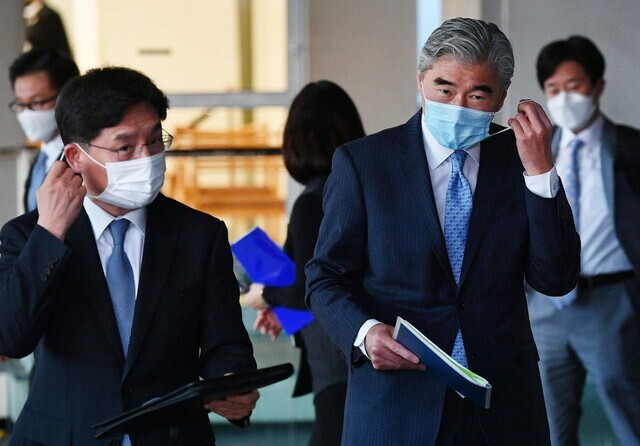hankyoreh
Links to other country sites 다른 나라 사이트 링크
US, S. Korea discussing draft text of end-of-war declaration

South Korea’s government is pushing for a declaration to formally end the Korean War as a way of bringing North Korea back to the dialogue table, and South Korea and the US are reportedly discussing the text of such a declaration.
Speculation is mounting over whether Washington — whose opinion on the declaration remains unclear — will publicly announce its position on the matter.
A high-ranking South Korean official in Washington on Tuesday spoke to reporters after a meeting of the top nuclear envoys of South Korea, the US and Japan, saying, "South Korea and the US have reached a consensus that the declaration on the war's end is quite useful as an opportunity to resume dialogue with North Korea.”
"This consensus is gradually growing," they added.
This signals a narrowing of the gap between Seoul and Washington in their views on the declaration through intensive talks before and after Sept. 21, when President Moon Jae-in proposed the declaration at the United Nations General Assembly in New York.
Seoul's top nuclear envoy Noh Kyu-duk and his Washington counterpart Sung Kim held five rounds of talks over the past 50 days in South Korea, the US and Indonesia.
On Oct. 12, National Security Office Director Suh Hoon held talks with White House National Security Advisor Jake Sullivan in Washington on measures for resuming the Korean Peninsula peace process, including an end-of-war declaration. In the process, both governments are known to be discussing a specific text for the declaration.
A high-ranking government official said, "The US deems it highly necessary to examine the impact of adopting the end-of-war declaration, and is considering it in depth internally."
Talks between South Korea and the US on the declaration's text could be a sign that Washington is seriously considering President Moon's proposal to formally end the war. It is premature, however, to consider a review of the text as a sure sign of it being formally agreed upon.
The US is apparently mindful of the potential for unforeseen problems such as the presence of the Republic of Korea-US Combined Forces Command, the US Forces Korea, and the United Nations Command-Rear in Japan if the Korean War is declared over.
In addition, Seoul might invite opposition if it agrees to the declaration without nailing down specific benefits in return for the sake of offering an "opening" for talks on denuclearization.
Washington is also said to have gone as far as hiring lawyers to review the declaration's text. While South Korea considers the proposed proclamation a "political declaration" with little practical significance, the US is a bit more sensitive to the political effects and legal impact.
A government official said, "It's still too early to definitively say what the US position on the declaration will be," adding that "it should be seen as a process of enhancing the understanding of each side's position."
Regarding US nuclear envoy Kim’s scheduled visit to Seoul this weekend, the official said Kim will "continue talks on the results of internal discussions by Washington on its consultations with Seoul and the declaration on the end of the war."
Turning to humanitarian aid to the North, the official said, "Practical discussions are almost complete," adding that over the past several months South Korea and the US have discussed such assistance including that for health, quarantine, potable water and sanitation.
"Since this project requires North Korea's consent, when to do it must be decided based on the circumstances," the official said.
Such aid is one of two pillars Seoul is pushing for along with the declaration to persuade Pyongyang to pick up dialogue again.
By Hwang Joon-bum, staff reporter
Please direct questions or comments to [english@hani.co.kr]

Editorial・opinion
![[Column] Tariffs on China: Trump was dumb, Biden dumber [Column] Tariffs on China: Trump was dumb, Biden dumber](https://flexible.img.hani.co.kr/flexible/normal/500/300/imgdb/original/2024/0520/191716191153918.jpg) [Column] Tariffs on China: Trump was dumb, Biden dumber
[Column] Tariffs on China: Trump was dumb, Biden dumber![[Column] What if Seoul took reunification by force off the table? [Column] What if Seoul took reunification by force off the table?](https://flexible.img.hani.co.kr/flexible/normal/500/300/imgdb/original/2024/0520/3017161928630494.jpg) [Column] What if Seoul took reunification by force off the table?
[Column] What if Seoul took reunification by force off the table?- [Editorial] Intensifying US-China rivalry means Seoul must address uncertainty with Beijing sooner than later
- [Column] When ‘fairness’ means hate and violence
- [Editorial] Yoon must stop abusing authority to shield himself from investigation
- [Column] US troop withdrawal from Korea could be the Acheson Line all over
- [Column] How to win back readers who’ve turned to YouTube for news
- [Column] Welcome to the president’s pity party
- [Editorial] Korea must respond firmly to Japan’s attempt to usurp Line
- [Editorial] Transfers of prosecutors investigating Korea’s first lady send chilling message
Most viewed articles
- 1Xi, Putin ‘oppose acts of military intimidation’ against N. Korea by US in joint statement
- 2Kim Jong-un wanted to meet with residents of shelled Yeonpyeong Island in South, Moon recalls in mem
- 3To weigh costs and benefits, Korea must stop treating US troop presence as a sacred cow
- 4Berlin mayor hints at tearing down ‘comfort women’ memorial in city
- 5[Column] What if Seoul took reunification by force off the table?
- 6[Column] Tariffs on China: Trump was dumb, Biden dumber
- 7For new generation of Chinese artists, discontent is disobedience
- 8[Exclusive] Truth commission to seek additional murder charges for figures behind 1980 Gwangju massa
- 9China, Russia put foot down on US moves in Asia, ratchet up solidarity with N. Korea
- 10Putin’s trip to China comes amid 63% increase in bilateral trade under US-led sanctions